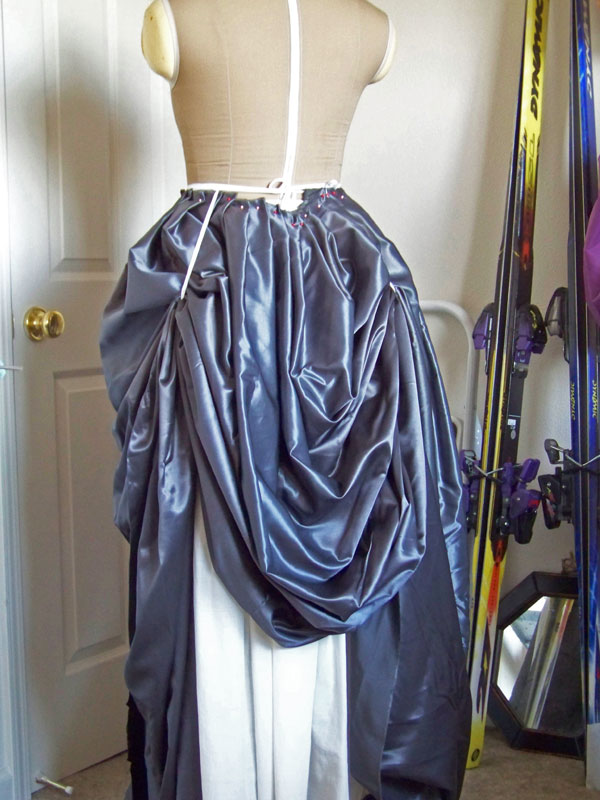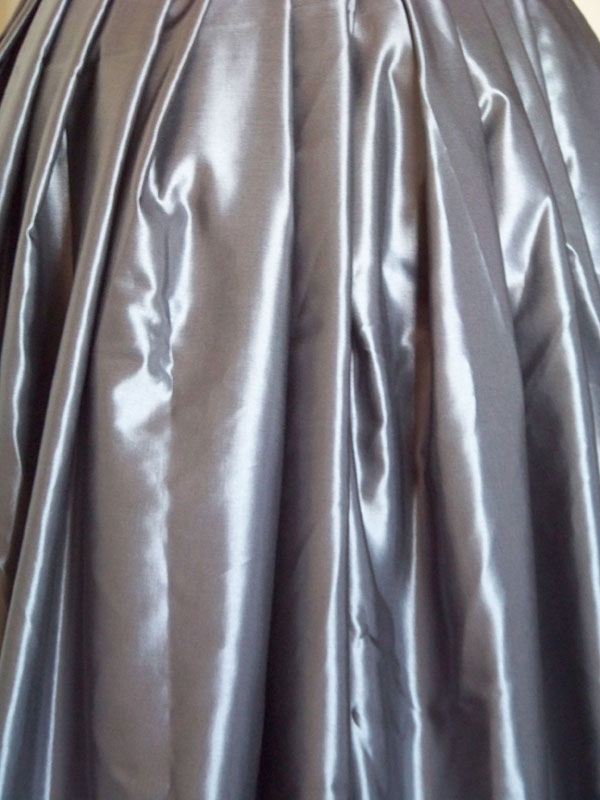
There comes a time in every girly costumer’s seamstressing career when she wants a pink polonaise, a huge, fluffy, crispy, pink taffeta 18th century polonaise. She salivates over the mere idea of it, as she flips longingly through the pages of the Kyoto Costume Institute Book, and eyeballs Janet Arnold’s not-so-hard-looking polonaise patterns in Patterns of Fashion 1: 1660-1860
.
Then she goes shopping for fabric online, looking for pink taffeta. She runs across a sale – $5/yd for silk taffeta, in steel grey. “Steel grey is a lovely color,” she thinks, “one of my favorite colors, in fact. How would a polonaise look in grey? Quite sophisticated, maybe.” She recalls that she in fact has some grey satin-y, shiny stuff tucked away in her stash, a fabric she bought years ago but then decided wasn’t good or appropriate for anything, being *gasp!* synthetic. She pulls it out anyway.

She haphazardly pleats the enormous length of gunmetal grey satin around her dress form, steps back and marvels at the glory of the fat pleats trailing down into a beautiful sweeping train. Oh, it’s GORGEOUS! Shiny, and gorgeous!

However, after fiddling for awhile with potential polonaise gatherings, she comes to a decision…………it’s just not right for 18th c.

What then? The fabric is asking to be made into, well, something, but it could be so many things! Then it hits her…the time has come to walk down the long, forgotten road of the 17th century, an era that has piqued our heroine’s curiosity for some time now, but as the Black Hole of Costuming, has been untouchable, unsewable, unthinkable!
Back in the first person, I set about collecting reference images I liked, primarily from two sources: the incomparable Kendra of Demode, who made a 1660s “Nell Gwyn” gown not too long ago; and Isis of Isis Wardrobe, who has been asking and posting about the 17th century for the past couple weeks, on her blog.




I decided in favor of the 1660s, and wasted no time in attacking my dress form with muslin and pins, draping a basic working pattern for the bodice. The gown shall be covered in metallic trims, set together to make wide swaths down the front of the bodice and skirt. The bodice will be front-closing with a hidden lacing placket, covered by the front edges, pinned into place to keep them closed. The bodice shall also be fully boned using 1/4″ zip ties, and I will not make a separate corset for this. The sleeves will be oh-so-puffy, with the large voile and lace cuffs midway up the forearm. I might also need a chemise of some sort.



Of course, this is exactly the sort of thing I ought NOT to be working on right now. I want to finish it in time for June Gaskells (at the end of that month), but have a mid-Victorian event in early June that needs to see a finish to my 1850s day dress I started back in December…and a bonnet…and accessories. How can I resist the new shiny ballgown though!? I suppose it shall all just have to be made up at once!



8 Comments
Margravine Louisa
April 25, 2010 at 3:13 AMyou are utterly mad mad mad! (you go, girl!) I am already drooling — so much to do, so little time! ! !
Anonymous
April 25, 2010 at 12:15 PMYay for baroque! That fabric is gorgeous and your draping is looking great so far. Go go channeling Nell Gwyn!
Gloria
April 25, 2010 at 3:27 PMWow, that fabric will look awesome in this project. Love your inspiration pics.
American D
April 25, 2010 at 7:46 PMThanks gals! I really have Isis to blame for this! I'll post again today with updates on the pattern drafting. I'm really REALLY excited for all of it to come together!
Jenny
April 26, 2010 at 8:44 AMExiting! This period is so lovely, and yours is gonna be splendid, I'm sure!
Yu have probably seen Kendra's page, but in case you haven't…..
http://demodecouture.com/projects/nellgwyn/
Isis
April 26, 2010 at 5:28 PMYes, I'm an evil influence! 😀
And that colour is just to die for! *want*
Lauren
April 26, 2010 at 5:41 PMDrool! That is going to be gorgeous!!!
Duchess
April 26, 2010 at 6:00 PMFreckles! You will see this gown at Gaskells next :-). Yes, Kendra's gown inspires me greatly – she was the first my known world of costumers to attempt 17th century. I feel a bit guilty for riding on her coat tails and using all her research (and blowing off about half of it, hahaha) to make my bodice, but hey, that is the glory of the internet!
Isis – you're only evil if this comes out looking horrid, lol!